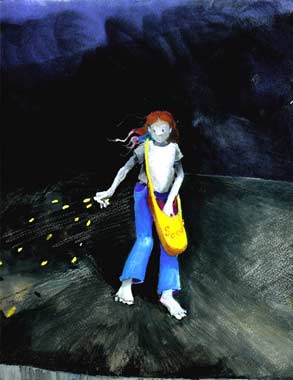of Galilee and was baptized by John in the Jordan.
And just as He was coming up out of the water,
He saw the heavens torn apart
and the Spirit descending like a dove on Him.
And a voice came from heaven,
"You are My Son, the Beloved; with You
I am well pleased."
The Spirit immediately drove Him out
into the wilderness.
tempted by Satan;
and He was with the wild beasts;
and the angels waited on Him.
MARK 1:9-13
The Holy Spirit drives Jesus into the wilderness like a nail into wood. For the ancients, who had no romantic notions of nature, the wilderness represented the realm of chaos, of evil. The wilderness was inhospitable, untamed, dangerous. It was the habitation of demons, a territory under the sway of Satan. And it is into this realm that the Spirit exiles Jesus.
The Greek word used for the Spirit's driving of Jesus into the wilderness is the same as that used for Jesus' driving demons out of tortured human bodies. But here, things are reversed. Instead of Jesus ejecting demons out of someone, we have the Holy Spirit injecting Jesus into the wilderness - the devil's turf. God is going on the offensive. Mark does not elaborate on the confrontation as do Matthew and Luke, but it is clear that the confrontation takes place and that Satan is defeated.
This is the beginning of the end for the evil one. "I watched Satan fall from heaven like a flash of lightning," says Jesus in Luke 10:18. The rest of Jesus' ministry - the exorcisms, the healings, the miracles - are part of the mop-up operation. Jesus is injected into the domain of Satan, symbolized by the wilderness, and His mission of reclamation and liberation has begun.
I am struck by the wildness in this passage - the heavens torn, the Spirit driving - a wildness that is an integral part of who God is. Yet we try so hard to tame that wildness. We have a tendency to try to domesticate God, to house-train Him. When we do that, we end up with a God who is just an extension of our own biases; a God who lends spiritual support to our political and social prejudices, who will not step on our toes or or drive us into the wilderness. But we also end up with a fairly anemic God - one who mostly wants us to be just a little more polite, a little nicer - certainly not a God who asks us to walk on the wild side.
We are all familiar with the domesticated images of God. He is the old man with a long beard, riding on a cloud - rather remote and old fashioned, out of touch with real life. There is Jesus "meek and mild", timid as a rabbit. In some of the old Hollywood films, we see this Jesus walking around as if He is trying to dry His nails. He does not appear as one who would get His nails dirty, let alone risk breaking one. Then there is the Holy Spirit, a vague, benign sort of spiritual gas, there to give me a little energy so I can get on with living my life the way I already know it should be lived. Such house-broken, tame images of God neither threaten nor excite.
The picture we get in the Bible is a much wilder one, and more exciting. Certainly, it is much more interesting. The God of the Bible is an irrepressible, sometimes ferocious God, even dangerous. If we are not at least a little afraid of God, we probably have too domesticated an image of God and one that is not very biblical. The God of the Bible might very well step on our toes. The God of the Bible might very well swoop down on us like a dove with serious intent. The God of the Bible might very well drive us into the wilderness. But that is good news. Only a wild God can deal with the wilderness of our world, with the wilderness of our own hearts. Only a wild and untamed God can save.
Remember the old westerns in which people gather in a wagon train to head across prairie and desert to get to the promised land of Oregon? These folk, gathered on the outskirts of St. Louis, need a trail guide to lead them through the wilderness. Clearly it is not going to be any of the characters introduced so far. It won't be the timid grocer, or the English dandy just off the boat. It won't be the wealthy banker; he can throw his weight around the financial district in New York but he won't be much use in the wilderness. Eventually the character who is obviously the man for the job appears. He is barely civilized, and undomesticated. He might be part Indian. He's got scars, both physical and emotional. You would not likely invite him to a tea party. But he is just the one you want to lead you through the wilderness.
Only a wild, undomesticated God can lead us through our wilderness. We need a God who is unafraid, a God who can enter into the wilderness of a world where first graders shoot down their classmates. We need a wild God who is present in the midst of floods, in the midst of starvation, in the midst of torture.
Jesus is the relentless love of God. He came to gather us into the Father's heart. He named us His friends. But, we must never forget that He is the Jesus who did battle with Satan in the wilderness. The same Jesus who said, "Suffer the little children to come to me", also tore through the temple like a cyclone. The same Jesus who came calling us to repentance then dared to suffer for us and, according to 1st Peter, went to hell and back for us.
Yes, the Holy Spirit is a dove, the comforter. But the Holy Spirit is also a fire, come to burn away the dead brush of our lives like a wild, prairie fire making room for new life. The same Holy Spirit who tore open the heavens can tear open our lives and inject Jesus into the wilderness of our hearts to conquer whatever demons hold us captive.
If the Holy Spirit wants to drive Jesus into our hearts and make us "little Christs", it is the Spirit's intention to inject us into the wilderness of the world around us. There we can dare to confront the demonic in our world. We can personify peace in a society captivated by violence. We can seek justice and righteousness. We can live lives of hospitality and generosity. We can take part in His mission of reclamation. We can be part of His healing and reconciliation.
Lent is about exposing whatever keeps us from allowing the Holy Spirit to have His way with us. This is frightening because we don't really like change. Change is often uncomfortable, even painful. We mostly prefer a tame dove to one that might tear things apart and drive us into the wilderness. What might the Spirit of the wild God do with us? We are not sure we trust that the changes the Spirit might drive us to will be for our truest joy. But the faith we are called to is exactly that kind of trust.
Ultimately, the Spirit is indeed driving us toward our truest joy: participation in God's life. Ultimately, the Spirit who is a wildfire, burning away our dead wood, is also the refining fire come to remove the dross from our lives and recreate us into finest gold and silver. When we understand this, we can finally, genuinely dare to say, "come, Holy Spirit, come."
Matthew Gunther is the rector of St. Barnabas Episcopal Church in Glen Ellyn, Illinois. Printed in Prism magazine.











